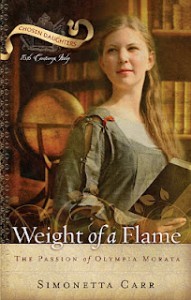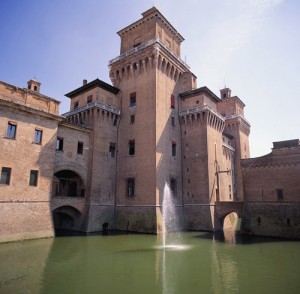Simonetta Carr is one of my favorite authors writing about historical subjects today. Her care for historical detail shows in all her biographies for children, including her books on John Calvin, Augustine, and John Owen. I’ve also had the pleasure of interviewing Simonetta twice already and I always enjoy the thoughtfulness behind her work.
One thing to keep in mind when reading Mrs. Carr–she is writing in a second language! She is from Italy, a fact that gives her peculiar insight into the life of her subject here, Olympia Morata. I’m hoping that we can use this month to look at a few other Italian stories for kids, but until then, Simonetta’s book on Olympia Morata is a very good window to a far away place and culture. And while it requires a bit more patience and initial investment than something like The Hunger Games, it also promises to pay its readers back that much more with moral and spiritual insight.
 1. Tell us a little bit about Olympia Morata. What made her an intriguing historical figure?
1. Tell us a little bit about Olympia Morata. What made her an intriguing historical figure?
When P&R suggested I could write a book for their Chosen Daughters series I thought of Olympia for many reasons. For one thing, she had a short but very full and adventurous life, which meant I could include many of the events and feelings which crowded her teenage years. Since this series is published specifically for teenage girls, I thought that was very appropriate. Johann Wolfgang von Goethe wrote in his diary, “I have read the Letters by Olympia Fulvia Morata, which have shed a whole new light on the actual condition of Protestants in those days.”
Olympia’s life is made intriguing to us by both her experience and her writings. She lived during one of the most critical times in European history and became arguably the most prolific woman writer of the Reformation, deeply respected and admired by scholars and religious reformers alike. Our ability to relive that extraordinary experience through her very personal letters makes this quest almost irresistible.
2. What was the role of women around the time of the Reformation?
Women definitely played an active role during the Reformation, in different ways, depending on where they lived. Noblewomen, in particular, had the time and means to devote to theological studies, but there were many exceptions. Olympia, for example, was not a noblewoman, but her father was a scholar and she had the privilege to live in a ducal court for several years.
Interestingly, Protestantism, particularly Calvinism, gave many opportunities to women in the 16th century to participate more fully in the religious life and in theological discussions. In the home it was often the women who kept the devotional fires burning since men were often entangled with war. In France in particular many women were responsible for the conversion of their husbands to Protestantism. Besides, at least for some time, Protestantism changed the dynamics in marital relationships. In Olympia’s life, this is clear in the respect her husband Andreas had for her (he often introduced her to others as “my colleague”) and in a beautiful prayer she wrote on occasion of her wedding, which is included in my book.
3. How did you do your research on this time period? Any great resources you could recommend?
The one source I highly recommend specifically about Olympia is Holt N. Parker, The Complete Writings of an Italian Heretic, published by University of Chicago Press. There are some older books about her life, but this is the most reliable and complete work in print today, and it includes all her existent letters and poems.
There are of course many valuable books about the time period in general; the most pertinent is probably Roland Bainton’s Women of the Reformation in Germany and Italy.
About my own research, I have a great interest in both the history of women in the church and in the Italian Reformation, so I have been reading much on these subjects for quite some time. Since Weight of a Flame is a fictional biography (in the sense that all events are factual, only the details are the fruit of my imagination), I had to do a great amount of research on daily life in the sixteenth century. I have read diaries of common people and travelers, cookbooks, letters to a father to her daughter who lived (like Olympia) in a ducal court, and a book written by an Italian Reformer who escaped to England and decided to teach the English population how to eat fruit and vegetables.
I also consulted experts. Dr. Giovanni Kezich, director at the Museo degli Usi e Costumi della Gente Trentina, gave me some invaluable information on the condition of the roads from Italy to Germany at the time of Olympia’s travels. He also suggested that I read Goethe’s diary of his travels to Italy and his description of his journey from Germany, to help me describe Olympia’s journey in the other direction. I also spoke personally to Dr. Francesco Scafuri, historical researcher for the City of Ferrara, who gave me the floor plans of the house of Ludovico Ariosto, a well renowned poet who lived in Ferrara at the same time as Olympia, to give me an idea of the general appearance of Olympia’s house, since her father was also a literary scholar.
I could go on and on. I don’t think most people realize the amount of research that went into this book! That’s why I will think not twice but ten times before I ever write something like this again.
 4. How did your own background (being from Italy) help or hinder the writing process?
4. How did your own background (being from Italy) help or hinder the writing process?
It was obviously helpful when writing about Italy, since I know the places and the culture well. Also, Italians are very knowledgeable about Renaissance times. The history of Italy is taught extensively in their schools but is also all around them. Italy is like a huge and exciting open-air museum. I could also identify with Olympia in some ways, since my mother taught Italian and Latin in schools and passed on that knowledge to me when I was still very young. She used to show off my prowess in reading when I was four (I added to the amazement by holding the books upside down!). Our house was always full of students, scholars, and even some members of the nobility, so I could draw from all those experiences while I was writing. The description of the fog around Ferrara is a memory from train trips I used to take with my mother around that area. My father taught Mathematics and Physics, but besides those subjects he loved to teach me fun facts, songs, and tongue-twisters, including the Latin tongue-twister Olympia’s father taught her in my book. I was actually very excited when I found it in one of his letters to her!
Hindrances – I knew nothing about Germany. I went as far as the borders between Italy and Germany or Austria on some occasions. So I had to really study the condition and culture of that country at that particular time. It was funny to find that many of the stereotypes we hold today about different countries in Europe were the same back then.
5. What would you like for the lasting impact of this book to be on young readers?
I don’t think biographies (fictionalized or not) should try to teach a specific lesson, so that was never my goal. I just want readers to know Olympia and her times in a very personal way, and I think the fictionalization of details can help to do that, just like visual illustrations. I think young readers will be able to identify with Olympia in many ways. Some may share her love for studies. Others may be familiar with the pressure of trying to achieve, for personal goals or to please others. They might recognize some of her questions and doubts, and see how God helped her to resolve them. In short, it will help them to think. As author Terry Delaney said in his review of this book at Christian Book Notes, “Any work, be it historical fiction or theological, that gets the reader to think on the most important matters of life is definitely worth your time.”
For more by Simonetta Carr, see our interview with her about heroes of the faith, or learn more at her own website, Christian Biographies for Young Readers. Another kids’ book author, William Boekestein, actually helped his kids make a short flimography of Simonetta Carr’s book on Olympia Morata. For a look at that very sweet production, see here.
Support our writers and help keep Redeemed Reader ad-free by joining the Redeemed Reader Fellowship.
Stay Up to Date!
Get the information you need to make wise choices about books for your children and teens.
Our weekly newsletter includes our latest reviews, related links from around the web, a featured book list, book trivia, and more. We never sell your information. You may unsubscribe at any time.
We'd love to hear from you!
Our comments are now limited to our members (both Silver and Golden Key). Members, you just need to log in with your normal log-in credentials!
Not a member yet? You can join the Silver Key ($2.99/month) for a free 2-week trial. Cancel at any time. Find out more about membership here.
5 Comments
Leave a Comment
You must be logged in to post a comment.


What an interesting interview! I love hearing an author talk about all that goes on behind the scenes when writing a book.
Thanks, Hayley! I thought Simonetta did a good job with my questions, too. Still would like to know more about her childhood in Italy.
Yes, it sounds like she had a fascinating childhood! Maybe someday she could write an author’s autobiography 🙂
Thank you Emily for this fun interview! I always thought my childhood was pretty average, but maybe not… 😉 If anyone wants to know more about all that goes on behind the scenes of book writing, they can see my blog at https://www.cbfyr.com/blog-2/.
Wonderful, wonderful! I aim for my children to become writers – good writers. I’m thankful for this insightful interview and for the opportunity to visit Simonetta Carr’s website. Along these lines, I’ve been visiting Janey Cheaney’s site, and I’m more diligently honing my own writing. I wonder what other writing-author-focused websites you would recommend? Books about writing? Thank you!